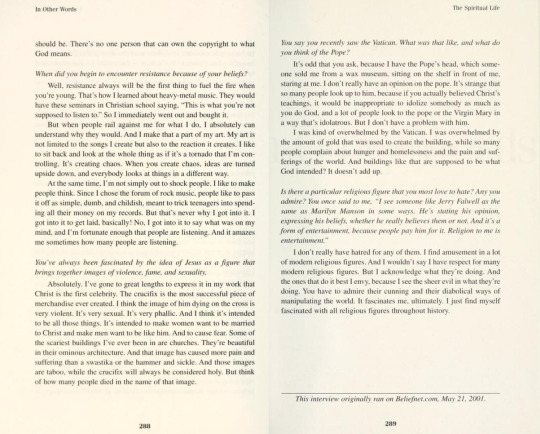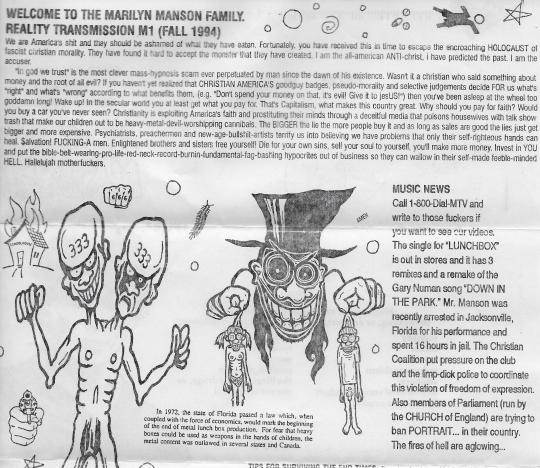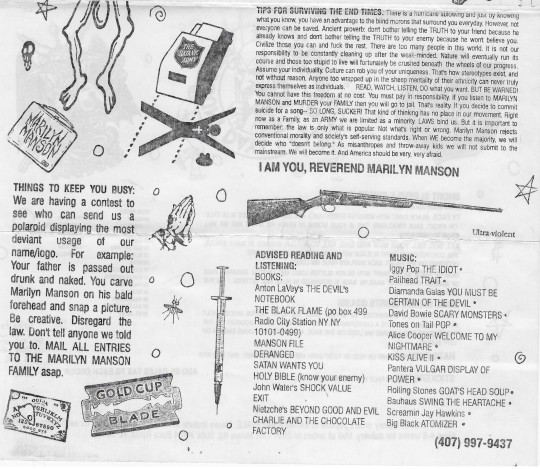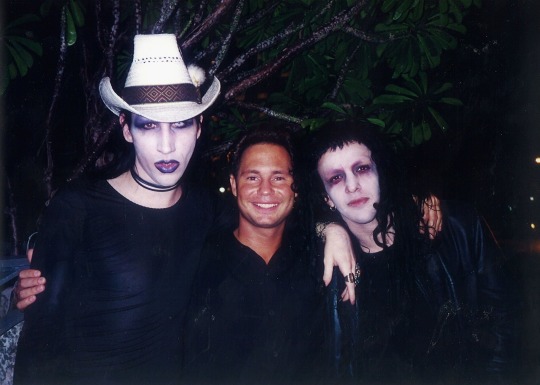Text
Manson Birthday, again. Looking fantastic!
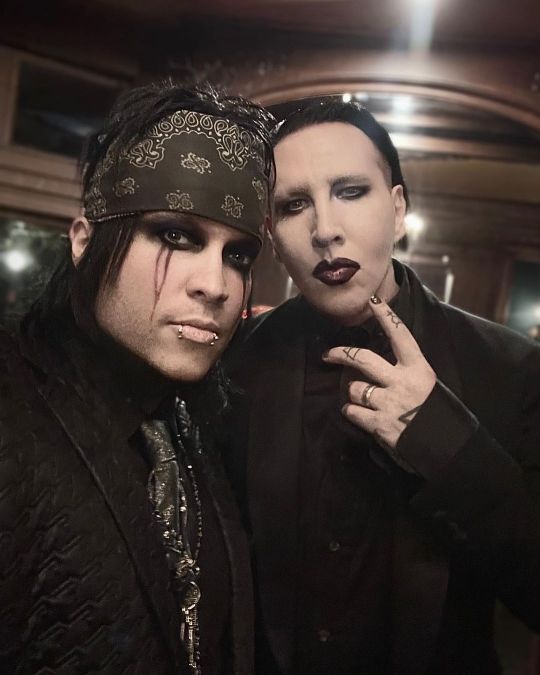
24 notes
·
View notes
Text
It was Manson day on IG today. : )
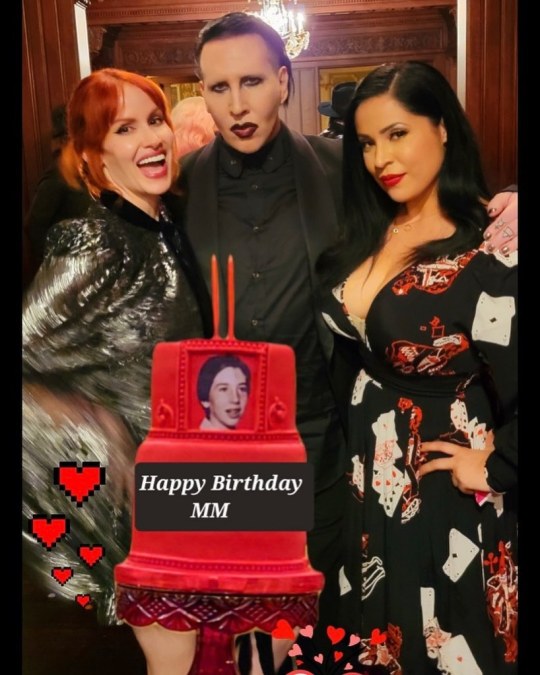
16 notes
·
View notes
Text
The King & The Queen

5 notes
·
View notes
Text
HAPPY BIRTHDAY, MR. MANSON !!!


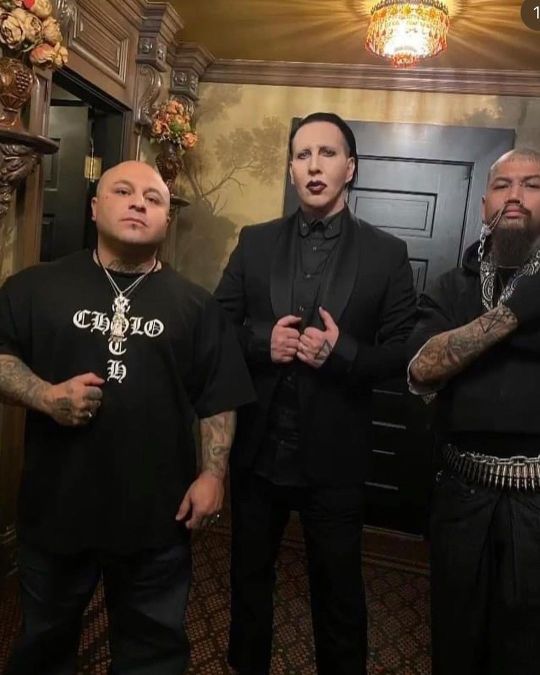
21 notes
·
View notes
Text
The Prism Archive: Manson Interviews
Manson: Olivia Newton Bundy
Manson: Gidget Gein
Manson: Daisy Berkowitz
#talks#marilyn manson#marilyn manson and the spooky kids#olivia newton bundy#gidget gein#daisy berkowitz
13 notes
·
View notes
Photo


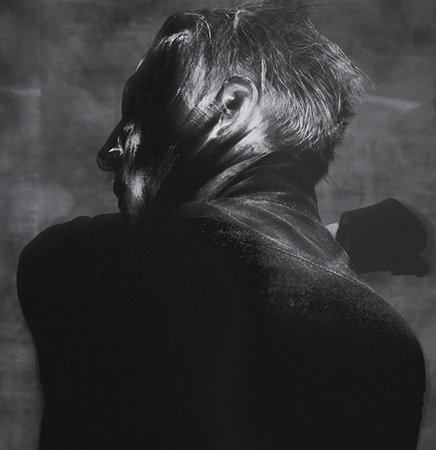

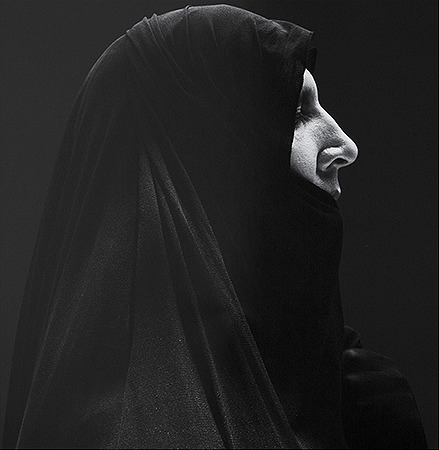

Marilyn Manson by Nicholas Alan Cope
4K notes
·
View notes
Video
Beat the Devil (2002) dir by Tony Scott
BMW released a series of high end “film ads” short films between 2001 and 2002, all featuring Clive Owen as a driver for hire. In this short, the driver takes James Brown to meet the Devil (Gary Oldman) to renegotiate his contract, with cameos by Danny Trejo and Marilyn Manson.
https://en.wikipedia.org/wiki/The_Hire
40 notes
·
View notes
Text
LHROH - II Deformography - 9 The Rules: DRUGS
There is a stereotype among people who have never gotten high that anyone who has ever done drugs, no matter what that drug is, is an addict. The truth is that addiction has little to do with what drugs you use or how often you use them. There are other factors, like the extent to which you let them run your life and your ability to function normally without them. I make no secret of my drug use. But at the same time I have nothing but utter contempt for anyone who is addicted to drugs. It is the people who abuse drugs that make the people who use them look bad. Here are a few simple rules to help you determine whether you are a user or an abuser of cocaine, pot and other substances. Consider yourself an addict if…
1 …YOU ACTUALLY PAY FOR DRUGS.
2 …YOU USE A STRAW AS OPPOSED TO A ROLLED-UP DOLLAR BILL.
3 …YOU USE THE WORD blow.
4 …YOU’RE A GUY AND YOU’RE BACKSTAGE AT A MARILYN MANSON CONCERT (UNLESS YOU’RE A DEALER OR A POLICE OFFICER).
5 …YOU OWN MORE THAN ONE PINK FLOYD RECORD.
6 …YOU DO COCAINE DURING A SHOW. (IF YOU DO IT AFTER A SHOW, YOU’RE OKAY. IF IT’S BEFORE, YOU’RE TEETERING ON THE BRINK.)
7 …THE MERE MENTION OF COCAINE MAKES YOU PASS GAS OR THE SIGHT OF IT MAKES YOU WANT TO TAKE A SHIT.
8 …YOU’VE WRITTEN MORE THAN TWO SONGS THAT REFER TO DRUGS.
9 …YOU GET KICKED OUT OF A BAND FOR BEING A DRUG ADDICT.
10 …YOU’RE FRIENDS WITH A MODEL.
11 …YOU LIVE IN NEW ORLEANS.
12 …YOU PAY FOR YOUR GROCERIES WITH ROLLED-UP DOLLAR BILLS.
13 …YOU’VE EVER BEEN IN DR. HOOK OR KNOWN THE LYRICS TO A DR. HOOK SONG.
14 …THE EMBOSSED NUMBERS, PARTICULARLY THE 0’S, 6’S AND 9’S, ON YOUR CORPORATE CREDIT CARD ARE FILLED IN WITH A MYSTERIOUS WHITE POWDER.
15 …YOU’RE ALONE IN YOUR HOTEL ROOM ON TOUR AND YOU DO DRUGS.
16 …YOU DO DRUGS BEFORE 6 P.M. OR AFTER 6 A.M.
17 …YOU HATE EVERYBODY. (IF YOU LIKE EVERYBODY, YOU’RE ON ECSTASY AND I’M AGAINST YOU.)
18 …YOU KNOW THE NAME FOR THE FLESHY CREVICE BETWEEN YOUR THUMB AND INDEX FINGER.
19 …YOU’VE EVER SAID, “THIS IS MY LAST LINE” OR,
CONVERSELY, “WHICH LINE IS THE BIGGEST?”
20 …YOU INVITE PEOPLE TO STAY AT YOUR HOME WHILE YOU’RE ON DRUGS.
21 …YOU TELL ANYBODY ABOUT YOUR CHILDHOOD WHILE YOU’RE ON DRUGS.
22 …YOU’RE NOT THINKING ABOUT TITS RIGHT NOW.
23 …YOU SAY, “I ONLY DO THIS WHEN I’M WITH YOU.”
24 …YOU HAVE YOUR BODYGUARD WATCH THE DOOR
WHEN YOU GO TO THE BATHROOM.
25 …YOU’RE A GUY AND YOU TALK TO A GIRL WHO HAS A BOYFRIEND FOR MORE THAN FIVE MINUTES BECAUSE SHE HAS DRUGS.
26 …YOU’RE A CHILD ACTOR.
27 …IF YOU MAKE THIS BOOK INTO A GAME AND DO A LINE EVERY TIME DRUGS ARE MENTIONED, THEN NOT ONLY ARE YOU AN ADDICT BUT YOU MAY BE DEAD.
RULES I’VE [MANSON] BROKEN: 1, 4 (but that doesn’t count), 5, 6 (and I came back on stage with the dollar bill hanging from my nose), 7, 8 (I’ve written dozens), 12, 13, 14 (unless I’ve cleaned it out because I’m crossing a border), 15, 16, 17, 19, 20, 21 (but only for this book), 24, 25.
2 notes
·
View notes
Text
Kat Von D and Marilyn Manson in the recording studio yesterday.
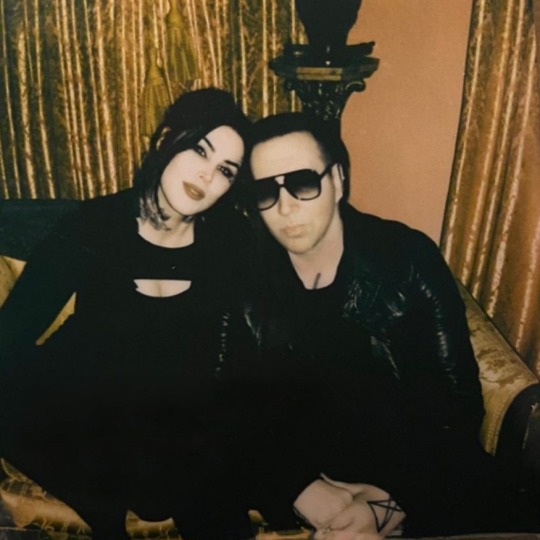

9 notes
·
View notes
Text




photos: Mick Hutson, 1996
16 notes
·
View notes
Text

6 notes
·
View notes
Text
34 notes
·
View notes
Photo

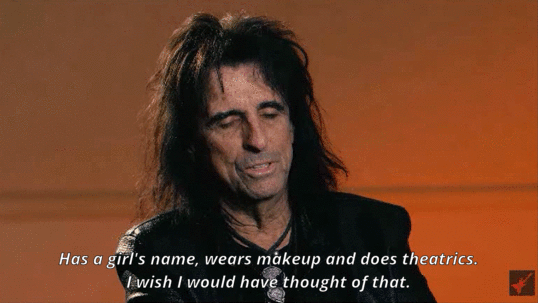
Alice Cooper on Marilyn Manson.
1K notes
·
View notes
Text
New York Times: R-Rated Rock Concerts? Marilyn Manson and Mom?
By Neil Strauss
Dec 1, 1997
In an attempt to save their businesses from complaining parents, restrictive legislation and increased police scrutiny, concert hall operators are considering a rating system for performances similar to those used for movies, television shows and recordings.
They are evaluating proposals that range from an industry wide obscenity-warning label that would appear on tickets to movie-style ratings. A rating of G would denote tame fare, while an R would be assigned to risque hard-rock and rap concerts off limits to minors not accompanied by adults.
''Do I think a rating system is needed? Yes,'' said Scott Williams, the general manager of the Delta Center arena in Salt Lake City, who participated in a panel discussion of the issue at a recent industry convention. ''Do I think it's coming? Yes. Will it be a help to me in running this facility? Yes.''
Several state legislators are preparing bills requiring music promoters to warn parents about concerts with obscene language or gestures. Other lawmakers are considering banning minors unaccompanied by adults from certain shows or just forbidding those concerts altogether.
''Our kids are being affected by this trash,'' said Daniel Tripp, a Republican state representative in South Carolina who is drafting a bill to prevent explicit concerts from being performed at places owned or financed by the state. ''I want to have some standards set up. I'm looking at these concerts in the same way I do pornography.''
But there is fierce opposition to such measures. Some in the music industry feel that not only will concert ratings hurt the business, because many rock and pop bands have a high-school-age following, but that they are illogical as well.
''I would fight concert ratings to the death,'' said Nina Crowley, executive director of the Massachusetts Music Industry Coalition, which combats efforts to restrict or rate musical expression. ''How do they know what's going to happen in a concert? Music's not that predictable, and it shouldn't be.''
From the days of vaudeville and burlesque to the birth of rock-and-roll to the rise of heavy metal and rap, there have always been off-color shows. Local obscenity and zoning laws serve to restrict some of these performances. But never has the call to rate and classify performances been so strong.
''Most parents have never heard of the groups their kids are going to see with their friends,'' Mr. Williams said. ''When they read that during the concert the male vocalist dropped his pants and played with himself, they'll call me and ask what kind of idiot I am to be showing this stuff to their kids. They have no way of finding out ahead of time, so they need a rating system. And quite frankly, so do I.'' He continued, ''If we don't start some kind of system soon, somebody else is going to do it for us.''
To some extent, the focus on concerts has been shaped by a ratings ground swell. Recently, most television networks began rating their shows for content. Last month a Congressional subcommittee held hearings calling for stronger advisory labels on recordings with explicit lyrics. And some 40 organizations, including software companies, Internet businesses and children's advocacy groups, are meeting in Washington today to debate Internet content ratings.
The concert industry takes in an estimated $2.5 billion in ticket sales a year. Bob Grossweiner of Performance magazine, a trade publication, estimated that a quarter of those proceeds are from concerts that include expletives or obscenity, whether in a song, a speech or accompanying dancing.
Less than 2 percent of that revenue, others estimate, comes from bands that deal with explicit themes in nearly every song. Only a tiny sliver of groups give shows that revolve around gory or sexual theatrics, including well-known performers like Alice Cooper and Marilyn Manson, and lesser-known ones like Gwar, the Impotent Sea Snakes and Insane Clown Posse. A few acts (Butthole Surfers, Jane's Addiction, Catherine Wheel) have nude or topless dancers or show violent or pornographic films onstage.
The spark that lighted the fires for concert ratings and restrictions, many say, was a yearlong tour by the cross-dressing hard-rock group Marilyn Manson that ended this fall. As the band traveled the country, trailing rumors of onstage antics both false (killing puppies, dispensing drugs to minors, sacrificing children to Satan) and true (tearing up Bibles, using the American flag as toilet paper, screaming obscenities), some towns and legislators mobilized to stop the band from performing.
Representative Tripp tried to pass a resolution forbidding Marilyn Manson from performing on state property. But he was forestalled when the University of South Carolina in Columbia, where the concert was to be held, used a clause in its contract enabling it to pay the band for the concert without letting it perform. The bill remains in committee.
The New Jersey Sports and Exposition Authority forbade Marilyn Manson to perform at Giants Stadium this year but was forced to reverse its decision by a Federal District Court judge. In Virginia, a Richmond city councilman asked the Council to research the legality of rating concerts after attempts by city officials to cancel a Marilyn Manson show failed there.
Dale Shugars, a Republican State Representative in Michigan, had a nonbinding resolution passed asking concert-hall operators to restrict the access of minors to shows by acts whose recordings have parental advisory warning labels. Representative Shugars said he wanted to make that resolution a law, with a few minor changes.
Alex Kochan, who books Marilyn Manson's concerts, noted that the band has abided by local obscenity ordinances during its current tour, dropping the more outrageous stunts of its early club shows. ''Building managers think that they will be hurt at the box office if there aren't steps taken to warn people about what's going on,'' he said. ''But by the time most bands get to be national attractions, they don't do the same thing. The process of becoming a national act is self-governing.''
Still, some in the industry are open to discussing concert ratings. Hillary Rosen, president of the Recording Industry Association of America, said she would oppose any attempts to restrict minors from attending rock concerts but would not object to an efficient parental warning system similar to the one her organization established for albums 12 years ago.
But a problem with rating concerts, both critics and some supporters of such measures say, is that unlike television programs and movies, concerts can change from show to show.
The solution most likely to appear in the next year, some say, is not an industry consensus on concert ratings but individual building owners establishing their own system with their communities in mind. Mr. Williams of the Delta Center arena, for example, said it was possible to rate a concert in advance. Of the ratings system used for films, he said: ''I'd contract with the artist that I want a PG-13 show, and if they still want to do an X show, they can take it somewhere else.'' Others, like Michael Marion, general manager of the Alltel Arena in Little Rock, Ark., advocate that bands that must carry the recording industry's parental advisory warning on their albums should replicate that advisory in their local promotions. Concert-hall managers must straddle the fence, said Mr. Marion, who organized the panel debating concert ratings. ''There's freedom of speech, but there's also a community that has certain expectations about what type of entertainment you present. Parents should be informed if something's not acceptable to community standards.''
First Amendment activists have taken a stronger stance against concert ratings. ''There's a whole hysteria to provide parents with tools, tools to find out what's out there,'' said David Greene of the National Campaign for Freedom of Expression, based in Washington. ''But the minute we decide to label, we're making decisions for these parents for what is important to them and what isn't. Bands promote themselves with a certain image. They don't hide it. Ratings are the first step toward government involvement and intervention and legislation. It's not innocuous. And it's unnecessary because the information is already out there.''
Others say the debate is misplaced, focusing on morality rather than safety. ''What nobody's touching is concert safety, noise levels, moshing and stage-diving, which is continuing to injure concertgoers,'' said Paul Wertheimer, the president of Crowd Management Strategies in Chicago. ''There hasn't been one rule, one guideline, one law established for this kind of concert safety in 45 years.''
3 notes
·
View notes


